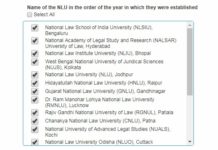This article has been submitted by Ahima Keshava for the CLATGyan Blog Post Writing Competition. If you think this article is a good read, ‘Like’ this article on Facebook (the button is at the bottom of this piece) or post a comment using the ‘comments’ section below.
“It seems to be almost fashionable these days to criticize the government. We must not allow this to deflect us.” – Sonia Gandhi
I agree, we’re a bunch of people who usually lack civic sense. We audaciously break rules. We cuss more than Teesta Setalvad’s poster girls would ever cuss Narendra Modi. RTI activism has become a sombre (or should I say not so sombre) validation of real time threats. As much as we let ourselves be bribed during the elections, we let ourselves feel let down immediately after. I say so on behalf of every empowered voice, if that must mean every ‘criticizing’ voice.
Knowledge fosters knowledge – a norm which fits every walk of life. If criticizing has become a ‘fashion’, so has underperforming. They’re both reflections on the same mirror of governance. It’s precisely how, as I remember from one of Sagarike Ghose’s blogs, ‘public’ is inserted into the republic. Why, then, does the right to speak not involve the right to being heard? I presume you have watched the parliament proceedings, you know why only too well. And this comes at a time when the brouhaha about sportspersons and actors being made parliamentarians refuses to die down. If nothing more, I was happy to read how witty tweets can get when it was announced that Jaya Bachchan and Rekha would be MPs!
But, ladies and gentlemen, we’re a country that listens. From Chidambaram and his Harvard accents to the ‘saatvi pass’ Anna Hazare. Even if that meant listening to Uma Bharti wanting to burn down wal-mart or Rahul Gandhi being disgusted with the idea of 24×7 social media.
The Sangh parivar makes me wonder if India’s relationship with the “West” during Vajpayee’s interregnum was forged. Their ideologies are in need of a dramatic overhaul. To say that it will re-institute a pre-independent day East India Company is a gross misunderstanding of the nation’s intellectual and political capacities. Little can grow on a plank of venal, residual politics. Speaking of which, it perhaps is time for Anna Hazare to float a political party and honestly contest elections. And I say this because persuading people not to vote for the Congress has considerably tarnished the political neutrality of this apolitically elected politician. The “foreigner” is no longer somebody we can hate in this milieu of globalizing economies. The BJP and Bengal’s didi wouldn’t agree with me on that.
But even Durga Ma’s blow didn’t match what the 2G Scam gave us. It isn’t even certain how much loss it has caused.
Rohinton Mistry’s A Fine Balance gives me a riposte: “Flirting with madness was one thing; when madness started flirting back, it was time to call the whole thing off.”
The vast economic divide in India is gnawing at its very heart. Elitism is corroding the bridge-building culture behind an iron veil without realizing that iron itself is prone to corrosion. The entitled class is on a collision course with those who, at some level, seem to want to take to the streets at every possible instance.
It’s not mud street havens alone, it’s also Bollywood’s red carpets with star kids and their chocolate looks in actual ‘Dirty Pictures’. After The Dirty Picture wasn’t allowed on national television with a ridiculous excuse, one cannot stop wondering why the porngate was given so much coverage. I would rather have liked it if somebody managed to raid our politburo’s bedrooms and then print them on glossy weekly magazines.
And why that would even leave the slightest imprint on us is, again, because we’re a nation that listens. Governments must learn from criticism and change because power, in a democracy, can never be absolute. Ignorance would give birth to a melodramatic stereotype, fed my media hypotheses. Listen, and at a very subtle level at least, allow every word to impact you. Even if it doesn’t do any good, there’s no way it can do bad. If the government refuses to learn from its people and critiques alike, it can never free itself from the tentacles of populist extremism.
Now go back and read my first quote.














